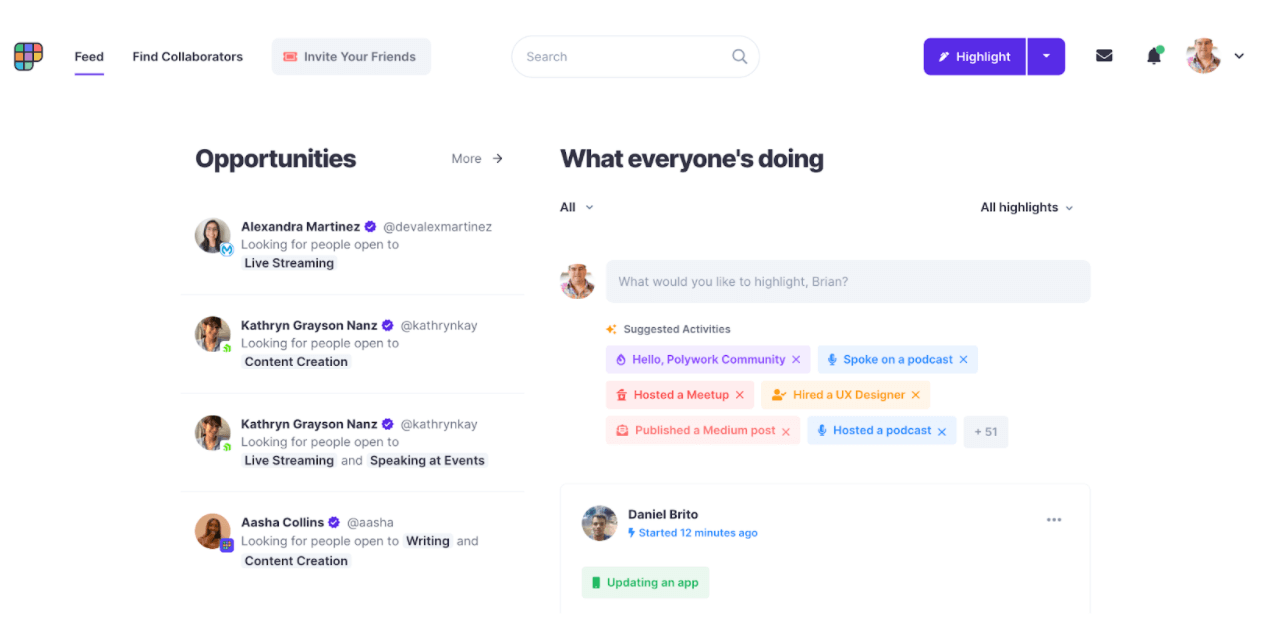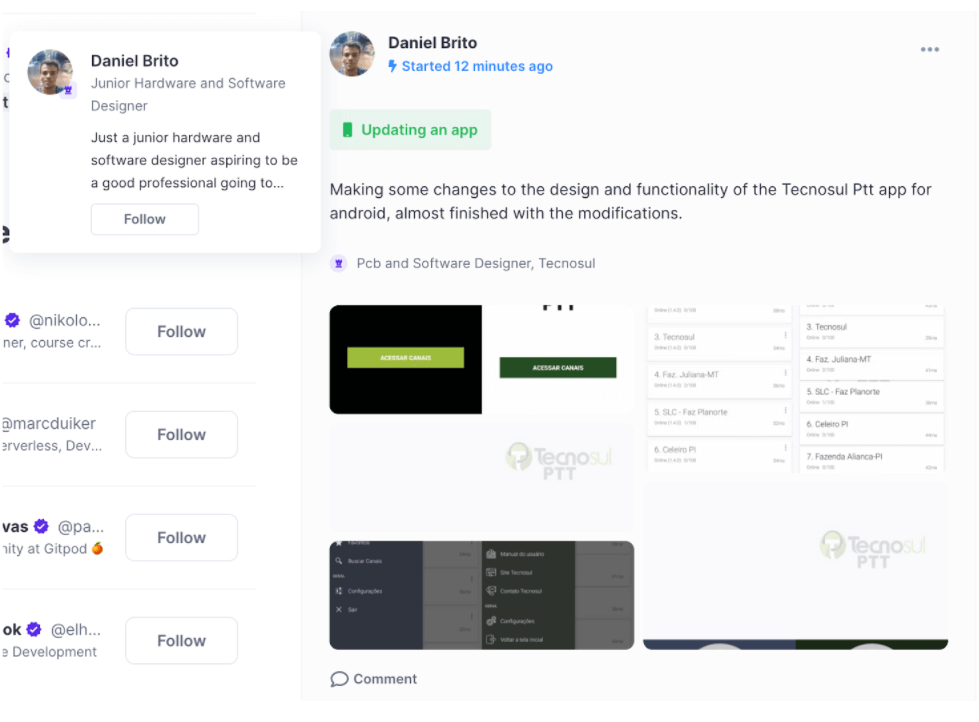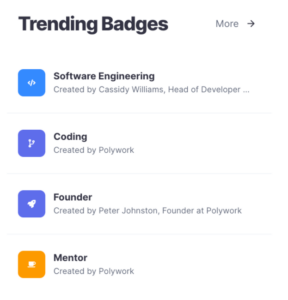What if there was an alternative to LinkedIn? Something that was more akin to Twitter, and less like the static resumes that either are fully baked or so scant you can’t make heads or tails of it?
What about the kind of information you seek when hunting down an expert, candidate, or potential partner on a platform like LinkedIn?
It would certainly help to know proactively the types of projects each person has led, or all the relevant extras they take on across their professional and personal lives, such as hosting a podcast, mentoring, or volunteering.
Next Generation Professional Social Network
Welcome to Polywork, a professional social network where people share what they do and collaborate with others.

Polywork is a small design-obsessed team working on building the next generation professional social network to enable people to share what they do and collaborate with others.
They believe that the world needs better information on what people can do to make it more productive. lets users create a free personality-focused professional profile where they can share updates and send collaboration requests to others on the network.
In contrast to LinkedIn, Polywork features “badges” to highlight personal and professional skills and interests as opposed to focusing just on a job title. Users also have the option to add projects and accomplishments to career timelines.
Whether it was pivoting careers or starting new projects like a podcast or a store on Etsy to pass the time, the pandemic amplified a growing trend of people who do more than one type of work. Existing professional social networks use the job titles we hold and schools we went to as the main way to identify who candidates are.
Is This Flawed and Outdated?
Consider for a minute the myriad of similar job titles we look for Site Reliability Engineers. At companies like Facebook, these engineers are called “Production Engineers.” Looking on LinkedIn for “Site Reliability Engineers” or “SRE,” actually eliminates results based on job title that could be a fit for the role.
Yes, as a social network dedicated to professionals, LinkedIn offers a treasure trove of business contacts, but I’d argue that there is more to learn about our candidates which yields better outreach and increased engagement.
All the result of being able to find or decipher a better picture of who our candidate is and what they are interested in doing or producing.
On the professional networking side, the approach allows users to get a quick visual overview of an individual — perhaps fleshing out some of the dry details they already saw on their LinkedIn account — and quickly navigate to individual examples of specific activity.
Recruiters looking for professional ice-breakers will probably relish the chance to find more up-to-date material to work with, ahead of making a cold pitch.

Current professional networking platforms don’t cut it. Your moniker might read “Software Engineer” or “Product Manager” or “Designer” and perhaps the school you went to. But these titles alone don’t come close to capturing what we actually do in our professional lives or the types of work we find motivating.
Enter Polywork and Resume 2.0
As opposed to being a resume directory with a social-professional network built adjacent to your resume profile, Polywork is a historical professional portfolio or journal that also is a social-professional network.
Polywork focuses on letting people tell their own stories and all they’re capable of, so we can meet new people, supercharge our teams, and unlock creativity.
From capturing details like who you collaborated with on various projects to career highlights, to a system of community-created badges reflecting both personal and professional traits, Polywork is building a new professional network, from the ground up, that reflects how we work in 2022.
It looks like Polywork is building a professional network that strongly appeals to the aesthetics of young professionals like influencers, developer advocates, designers, hustlers, lifestyle entrepreneurs, models and musicians.
These have been the early adopters. While making these observations, it’s important to consider the function and future of resumes because it becomes apparent that this network is for everyone.
What is a Resume, Anyway?
A resume is a pdf you email to a company. Another way to see it is that a resume is a burdensome standardized method of communication.
A resume is job-history-oriented, and that we use to verify an applicant’s supposed “experience,” right?
Candidate says they know Java, so they know Java. Right? Well, how well do they know it? Can you verify it via a code test or a code snippet from Github?
It’s not like carrying a certification from your state’s Bar Association, is it?
There is this supposed authenticity via the resume. With a resume it primes the hiring manager or recruiter to use job-history oriented as the filter:
- Is this person changing jobs too frequently?
- Does this person have gaps in their workplaces?
- Does this candidate really know Java?
After all, Java is to Javascript like Ham is to Hamburger. Same thing, right?
The problem with this analysis (and complete absence of logic) is that these are concerns and do not tell if an applicant is qualified.
Also, it does not adapt to the market as a whole.
Shitty References and Bogus Endorsements
References have not been legitimate for years.
Anyone can pretend to be your reference. Anyone can endorse your work without tangible proof.

People on LinkedIn will endorse me as being knowledgeable with SEM. This is preposterous.
The reason they endorse me: I used to place a lot of search engine analysts, managers, and sales people. It would be more useful if the proof of endorsement was tied to an activity such as posting a SEM certification like Google AdWords.
You can kind of replicate this on LinkedIn by mentioning people on a post in the public time-stream. However, it eventually becomes lost and cannot be easily filtered. The LinkedIn social network is adjacent, not your resume.
Opportunity Over Spam
Direct Messaging on LinkedIn, on the whole, is people messaging you for unsolicited services. It has us treat every connection or relationship with suspicion and apprehension.
Polywork has messaging with a purpose before being sent to a target user, a first big step to cut down on spam.
I could see them expanding this feature with their AI assistant to assess whether the sent message is genuine, meaningful and a wanted communication. The system could quickly penalize unapologetic spammers via an internal karma system.
Another option is to associate activity tags with contact types. This would allow contacting users to be forced to understand the context of what they are messaging for — and do their homework to understand if there is genuine alignment.
Can’t LinkedIn copy these features? Like how they can copy Instagram User Stories and Clubhouse audio chats?
Sure they could.
LinkedIn could replicate these features, but — and here’s the but:
The fundamental way the social network works, like connections and resumes profile through the public live stream, these features would be subject to exploit that render them not as valuable.
LinkedIn Resumes are not useless, but their value and purpose are going to change. LinkedIn is not positioned to deliver on Resume 2.0.
Find a Developer
If you know me, you know that I try 100 different ways to find developers and engineers. What does this Polywork have to do with developers?
The normal combination today for developers applying to a job is Resume + LinkedIn + Github.
Isn’t that a lot of “stuff” to supply in an application?
Polywork can solve all this in one package. I think that will be better for developer communities for their proof of work.
Duplicative Work
Convincing people to duplicate their social networking activity or indeed ditch their existing hard-won social media networks looks like a big ask. The risk is irrelevance, despite a pretty interface.
Sure LinkedIn is boring. The whole point is that it’s low maintenance.
Polywork’s name and philosophy suggests it might be okay with being added to the existing mix of professional and social networks, i.e. rather than replacing either. But, well, a supplementary professional network sounds like a bit of a sideline.
Polywork launched in April 2021 but isn’t disclosing user numbers yet — and is currently operating a wait list for sign ups.
By Brian Fink
As a Talent Acquisition Partner at McAfee, Brian Fink enjoys bringing people together to solve complex problems, build great products, and get things done. In his recent book, Talk Tech to Me, Fink takes on the stress and strain of complex technology concepts and simplifies them for the modern recruiter to help you find, engage, and partner with professionals.
Recruit Smarter
Weekly news and industry insights delivered straight to your inbox.





